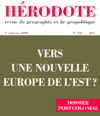Zone de contacts, zone de conflits. Histoire et géopolitique de la frontière russo-lettonne
par André Filler
Le 27mars 2007, la Lettonie et la Fédération de Russie ont signé à Moscou un accord définitif sur les frontières nationales. Il s’agit d’un acte majeur fixant pour une période sans doute prolongée les nouveaux contours du continent européen, qui a une portée décisive aussi bien pour l’Europe dans son ensemble que pour la république balte. Toutefois, des questions continuent àse poser autour de ce traité : pourquoi la Russie a-t-elle finalement consenti à conclure l’accord avec la Lettonie, quand celui avec l’Estonie demeure toujours suspendu ? Quelle est la réalité du terrain dans la zone frontalière. La zone balte est-elle un pont ou une barrière entre l’Est et l’Ouest ? L’article propose une lecture de cette nouvelle frontière sous deux angles : celui d’aboutissement de la construction étatique et territoriale pour la Lettonie, mais aussi celui de séparation voire de rupture consommée entre deux espaces, la Russie de Poutine et l’Union européenne.
Abstract : Zone of contacts or zone of conflicts ? History and geopolitics of the Russian-Latvian border
The 27th of March 2007, the Republicof Latvia and the Russian Federation signedin Moscow a final treaty on the nationalborder between the two states. One of theconsequences of this major act for theEuropean Union is the validation of the newcontours of the European continent. For theBaltic country the treaty is of utmostimportance as well. There remain still somequestions about the treaty. Why did Russiafinally consent to sign it with Latvia, whilethe similar negotiations with Estonia seemto be frozen by the Russians ?What bearinghad the treaty on the local reality ?Is theBaltic region a bridge or a barrier betweenEast and West ?The paper proposes to lookat the new border from two differentviewpoints:on one hand, as an accomplishmentof Latvian state and territorial construction,and, on the other, as the incarnation of arupture ever more assumed between the newEurope and Putin’s Russia.
Tweeter cet article Suivre @RevueHerodote sur TwitterL’institut Français de Géopolitique offre des formations de master intenses, exigeantes et passionnantes !
Hérodote est historiquement liée à la formation en géopolitique (master et doctorat) de l’Université Paris 8 — Vincennes - Saint-Denis, l’Institut Français de Géopolitique (IFG) où ont enseigné son fondateur Yves Lacoste, sa directrice Béatrice Giblin (également fondatrice de l’IFG), et une partie importante de l’équipe de la revue.
La première année est consacrée à la formation à et par la recherche, qui est au cœur du projet intellectuel et citoyen de l’École France de Géopolitique. Les étudiants et les étudiantes doivent écrire un mémoire de recherche d’une centaine de page appuyé sur une enquête de terrain d’un mois en autonomie. Un accompagnement fort leur est proposé pour favoriser leur réussite durant cette année si différente de leurs expériences précédentes.
En seconde année, quatre spécialisations professionnalisantes sont possibles : géopolitique locale et gouvernance territoriale, géopolitique du cyberespace, nouveaux territoires de la compétition stratégique, analyse des risques géopolitiques et environnementaux. Toutes ces spécialisations sont ouvertes à l’alternance, et la majorité des étudiants et des étudiantes a désormais un contrat d’apprentissage. Celles et ceux qui souhaitent faire une seconde année de recherche le peuvent, notamment en préparation d’un projet de doctorat.
Avec 85 places en première année, le master de l’IFG offre aussi une véritable vie collective de promo, animée notamment par une association étudiante dynamique. Les étudiantes et étudiants viennent de nombreuses formations et disciplines, notamment : géographie, d’histoire, de droit, de sociologie, de science-politique, Économie et gestion, langues (LLCE/LEA) ou de classes préparatoires.
Les candidatures en première année de master se font exclusivement via la plateforme nationale monmaster.gouv.fr du 26 février au 24 mars 2024. Toutes les informations utiles se trouvent sur le site www.geopolitique.net. En deuxième année, les candidatures doivent passer par le site de l’Université. L’IFG n’offre pas de formation au niveau licence.










